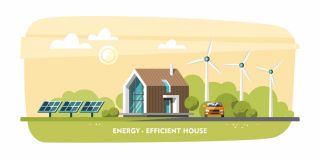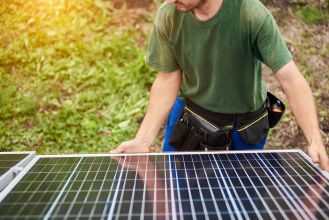Rooftop Solar Panels Benefits New Jersey | Residential Solar Panels System On Roof
What are rooftop solar panels?
A rooftop solar panel system is a collection of solar panels mounted on the roof of a building. The solar panels collect energy from the sun and use it to generate electricity. Rooftop solar panels can provide power for a home or business, and they can also help reduce greenhouse gas emissions.
Rooftop solar panels benefits
Rooftop solar panels systems are a great way to power your home and save you money. Not only can they provide electricity for your home, but they also help reduce pollution in the atmosphere.
If you consider getting rooftop solar panels, here are some benefits that might help you decide about installing solar array.
- Rooftop solar is a good way to combat climate change.
- Solar panels help the environment by reducing the need for fossil fuels
- Solar power is highly efficient
- Solar panels produce no emissions
- Reducing your household’s carbon footprint
- Using less water
- Reducing air pollution
Rooftop solar panel system is a good way to combat climate change.

Solar panels rooftop is one of the most effective ways to reduce your carbon footprint, making them excellent for combatting climate change.
Solar panels help the environment by reducing the need for fossil fuels.
When you install rooftop solar photovoltaic panels, you are helping promote the green economy by creating new jobs and reducing carbon emissions.
Using less water
Solar PV panels don’t require as much water as traditional power systems because they produce their own. In addition, the only water needed is for washing the panels from time to time.
Solar power is highly efficient.
One of the best features of solar power is that it is highly efficient. Because sunlight doesn’t require extensive resources to harness, it can be produced environmentally friendly and cost-effectively.
Solar panels produce no emissions.
Since rooftop solar systems use the sun’s rays as their primary source of power, they produce zero emissions while producing electricity for your home or at work. In addition, they do not pollute the ground or any water.
Reducing your household’s carbon footprint
Rooftop solar PV panels are one of the most effective steps you can take to reduce your carbon footprint. This is because they create electricity with no emissions, which makes them one of the greenest energy technologies available today.
Reducing air pollution
Solar power is a greener and cleaner energy source than fossil fuels. As part of the green economy, solar panels decrease smog and other pollutants in the air we breathe.
Solar power costs
The rapidly falling costs of solar mean it will play a significant role in providing electricity across the world. It’s hard to predict how the mix of energy sources will change over time because other options are also improving and government policies can have a big impact on their use. But it’s clear that solar is becoming an increasingly important part of the energy landscape.
Solar power costs have come down dramatically in recent years. This is due to a number of factors, including technological advances, increased competition, and economies of scale. In some parts of the world, solar is now cheaper than traditional sources of energy like coal or natural gas.
Solar energy industries are growing rapidly, and solar panels cost will continue to come down as these industries mature. It’s important to remember, though, that the cost of solar energy varies depending on where you live. In some places, it’s more expensive than in others.
Solar Benefits in terms of Financial Advantages
In addition to the above, there are also financial advantages of the rooftop solar system.
State, local, and federal agencies offer incentives for installing solar panels on your roof in some parts of the country. These incentives come in the form of tax credits, rebates, or exemptions.
The following is a list of financial benefits of rooftop solar system:
Incentives available from utilities

In those states where utilities have been granted legal permission to implement a net metering policy, they are now offering incentives as well. In addition to rebates and tax credits, some utilities provide unique rate plans for customers who produce more power than they use during the day and choose to feed that power back into the grid.
Incentives available from local governments
Many cities and counties provide incentives for customers who install rooftop solar panels, such as reduced permitting fees and expedited installation procedures. They also offer tax credits and rebates in addition to those provided by state or federal agencies. In some cases, these incentives are even funded by utility surcharges.
Incentives available from private organizations
Finally, some businesses have begun offering rebates and incentives for installing green technologies, such as rooftop solar panels. These companies provide free consultations, discounted green technology installation costs, and other perks in addition to the federal tax credit savings.
Warranties on Solar Energy Systems
Solar panels come with two guarantees: a performance and equipment warranty. The majority of solar panel warranties will guarantee 90% production at 10 years and 80% at 25 years. Without fail, an equipment warranty will usually last for 10-12 years. It’s important to keep in mind that warranties are only as good as the company backing them.
Check for warranty extensions, service plans, and equipment replacements if something happens prematurely.
What are the advantages and disadvantages of going solar?

The most significant advantage of solar power is that it’s free after the initial installation costs. There are no ongoing fuel costs other than solar panels, and you don’t have to deal with pollution or hazardous materials.
Financial incentives are also an excellent reason for installing rooftop solar panels. Federal agencies offer tax credits or rebates on your solar power system. Some state agencies also provide tax credits or rebates in addition to the federal credits, and your local government may provide property tax exemptions.
Rooftop solar panels are not only good for the environment, but they help reduce your carbon footprint too. Since rooftop solar systems use clean energy sources, no emissions pollute the air or water. This makes going solar an excellent choice for the environment and your local community.
However, there might be a few disadvantages of going solar, depending on where you live and how much money you have to invest in rooftop solar panels. In areas with little sunshine, it’s not feasible to install rooftop solar panels because the electricity production of rooftop solar systems depends on the amount of sun. Going solar is not a good choice in places with no incentives or rebates because your initial investment will be too high to make it worthwhile.
In addition, some people feel that rooftop solar panels are unsightly and spoil the look of their homes. However, new technologies are being developed that allow panels to look more appealing. If you’re interested in alternative power sources for your home, study up on all the benefits of the residential solar system and decide if they are right for you.
What is the key to the rapid expansion of rooftop solar energy?
Rooftop solar panel systems require federal, state, and local regulations to operate. Although a residential solar system does not generate energy on its own, it needs governmental policies to succeed. These policies include:
Property-assessed clean energy financing:

This policy allows homeowners and businesses to finance renewable energy investments through their property tax bills. It lowers the cost of capital by using the property as security and enables citizens and small business owners to transition to cleaner forms of energy.
Net metering
This payment method credits solar power system users for the power they export to the grid. Most rooftop solar plants use this policy to offset their utility bills or even make money from selling excess electricity back to the utility company.
Feed-in tariffs:
The government encourages installing new rooftop solar panels by offering a fixed price for power produced from small-scale renewable energy generators. This policy requires utilities to buy electricity from small solar producers, such as rooftop owners. In some cases, the policy can also guarantee a fixed rate over a certain period.
New Jersey Solar Incentive or SRECs:
This policy has been used in many states to increase their green energy portfolio. Utilities purchase SRECs from solar owners, and the latter can use them as a credit or sell them to utilities through a broker or other buyers.
Value-of-solar tariffs:
A value-of-solar (VOS) pricing policy is a rate design practice that credits solar consumers for the electricity generated by their PV system. A VOS pricing scheme specifies how much power is sold in each direction (customer to utility and utility to customer), as well as the price at which energy is valued.
Solar tax credit and subsidies:
Most homeowners benefit from the 26% federal solar tax credit (when they buy or lease a new solar power system. These incentives and subsidies can help solar energy system owners pay for their initial investment.
